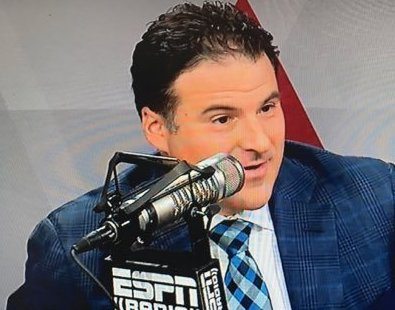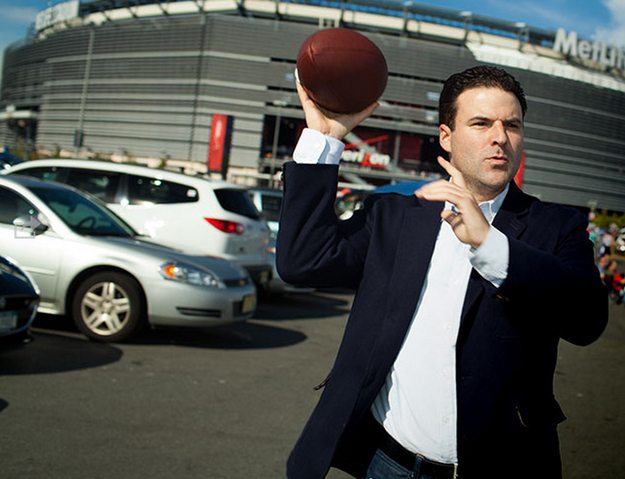#SameHere Influencers
Profile: Darren Rovell


Emmy-Award Winning Sports Business Reporter
Twitter: @darrenrovell
Instagram: @darrenrovell
What past life experiences, physical traumas or genetics do you believe have had an effect on your mental health?
I was 29 years old when it all hit me. A life of avoiding self-care and doing zero work on my mental health snuck up on me and broke me down. It took a couple years, but I discovered the root of my anxiety came from the lack of control I have over my ultimate future, even though on the outside my future was as certain as it could get for a person my age.
How did the effects on your mental health appear in terms of symptoms?
The thought of dying completely overtook my life. It was not rational, but it did not matter. I went to the Olympics in Vancouver, where I’d work non-stop around the clock for CNBC, having barely slept in 20 days. On the outside, I was simply on the air on-and-off for 10 hours a day. Inside my head, I was an absolute wreck. My knees shook from the adrenaline running through my body non-stop. My muscles were exhausted from the tension. I started to feel my pulse — 10, 20, 30 times per day. The thought of dying overwhelmed every other aspect of my life.
When and why did you decide to ask for help to get relief?
Saddled with both crippling anxiety and the need to perform in the short term, I sought the advice of a doctor for a “quick fix,” and I got prescribed 300 milligrams of a drug that knocked me out at night with the power of 10 Tylenol PMs. Waking up was nearly impossible, but I managed to play my role with confidence when duty called. When I returned home from the Games, I got to work. Not on my career, but real work — on myself. My No. 1 priority was to get my head straight and find out what was happening.
What methods helped you individually get/feel better?
I had to learn to rewire my brain through cognitive behavioral therapy.
I hope my 10 suggestions here will help you if you’re having similar thoughts.
1. Express Yourself: Do not keep your thoughts inside. Tell the people who you know and love how you feel. Say you feel sad. Say you feel confused. Say you feel unsure. And support others. Proactively ask them how they feel. Negative thoughts that circulate in our heads, with no outlet, cause negative outcomes — in our brains and bodies. Let it out!
2. Work Harder to Communicate: For our entire lives, we have been out in person, talking to others. It’s easy, now that so many of us have been confined to our homes, to shut down. Reaching out through text, FaceTime and Zoom requires more work. Do the work. Make sure you tell people you love them and what they mean to you. People need to know, now more than ever, how much you mean to them. Tell them they are important to your life and what they add. Talk about your favorite times together and share the best memories.
3. Redefine Yourself: Many of us define ourselves by our jobs. It might give us purpose and financial stability, but it is not who we are. If you define yourself by your job, work to create a new definition of your life that includes much more. The things we can’t put titles on and can’t measure, those are the things that truly define us.
4. Pick Time to Withdraw: As someone who racks up 12 hours of screen time per day in non-pandemic times, this is not done easily, but a break in routine is good. We often convince ourselves that routine helps us stay stable, but I’ve found that I’ve been able to withdraw at times more than ever — and it does lead to peace over anxiety. It’s like a power-washing of our brains, and allows us to shut down the parts that are always “on.”
5. Set Aside Moments for Self-Care: Whether it’s an app like Headspace or simply putting down the phone to practice deep breathing, don’t let everything build up. Create breaks in the day to reset. We call them “STARR” Practices with #SameHere. That stands for Stress & Trauma, Active Release & Rewiring. Here are some practices you can choose from if you want.
6. Do the Small Things to Feel Good, But Be Aware of Creating New Bad Habits: Not only should you brush your teeth and substitute your pajamas for jeans. You should exercise to help release those endorphins. Also, eat that dessert. Drink that wine. Take that CBD Gummy Bear. But it’s really important that you don’t do these things to just mask your pain. It’s why talking and the activities suggested above are so important.
7. Make a Goal: Lose weight. Get in shape for a race that has no date. Be a better sleeper. Reorganize your entire house. Be a better friend, husband, wife, father or mother. Goals give us back that purpose we do desire.
8. Get Back into Something That Made You Happy as a Kid: Open baseball cards. Buy and play a game you used to play. Eat your favorite candy again (for me, it would be Charleston Chew!). There are smiles in your memory bank that you can reignite.
9. Watch the News to Make Decisions for You and Your Family: Do not avoid the news. Use it to your advantage. The learning curve with this virus has been incredibly steep. One week we are in the office, the next week we are out of it. The following week we are social distancing, the next week we are ordered to stay at home. Things are happening so fast that you have to follow the news to stay informed, but it’s a balancing act: If you ever feel like the bad news is becoming overwhelming, it’s OK to turn off the TV.
10. Don’t Stress About the Data: Everywhere you turn, coronavirus data is being flashed in front of you. Seemingly hourly, we’re inundated with updates on the number of new cases and the number of tragic deaths. And, to be clear, the dissemination of that information is important: The sheer amount of cases and the exponential rise in deaths is the only thing that will get certain lawmakers (and certain citizens) to follow federal directives.
Most of all, please take a breath. All of our mental health is going to be challenged in the next couple of months. We need as much clarity as we can muster in our heads so that we can have the healthiest bodies and strongest immune systems possible.
Why did you decide to go public with your story? Who were/are you hoping to help and how?
I bring this up in detail for the first time because our country is not only going through a pandemic that has the potential to compromise our physical health, but it’s also going through a mental health crisis. Tens of thousands have lost their lives due to this deadly virus, and millions more are crippled by the thoughts of the world closing in around them.
People are terrified of getting sick, of dying. They’re scared for their livelihood. We were clearly not prepared for this health crisis — on the physical side and or the mental side. And the problem with the mental side is, you can’t measure it like you can with a 103-degree fever, and your ability to get help via an in-person face-to-face with a therapist or a psychologist is much more difficult. Even with the way I’ve devoted my life to mental health self-care through my work as the co-founder of the influencer alliance #SameHere, namely through presentations on college campuses that have reached thousands, the unprecedented uncertainty we are living in has admittedly challenged me mentally.
I had always wanted to get involved in something that had a greater purpose. As a journalist, I couldn’t help but notice all the attention a person received when they revealed they had a major mental health issue, and almost no other national attention at any other time. This doesn’t happen with other diseases or illnesses to this extent. Over time, I became more and more frustrated with the stigma associated with mental health. It bothered me. When I committed myself to getting involved with a greater good, I wanted to go into an area where I felt I could make a difference. When I finished reading Eric’s original story he shared publicly about his own experience, before this movement even began simply to help others, I was weeping. Despite both working in the sports industry for relatively the same amount of time, and growing up in neighboring towns, we didn’t know each other. Now we’re great friends. So happy that Eric battled through such a rough stretch, and so sad for so many who haven’t. I am determined to do all I can and joining this Movement, and forming this Alliance was my first step

